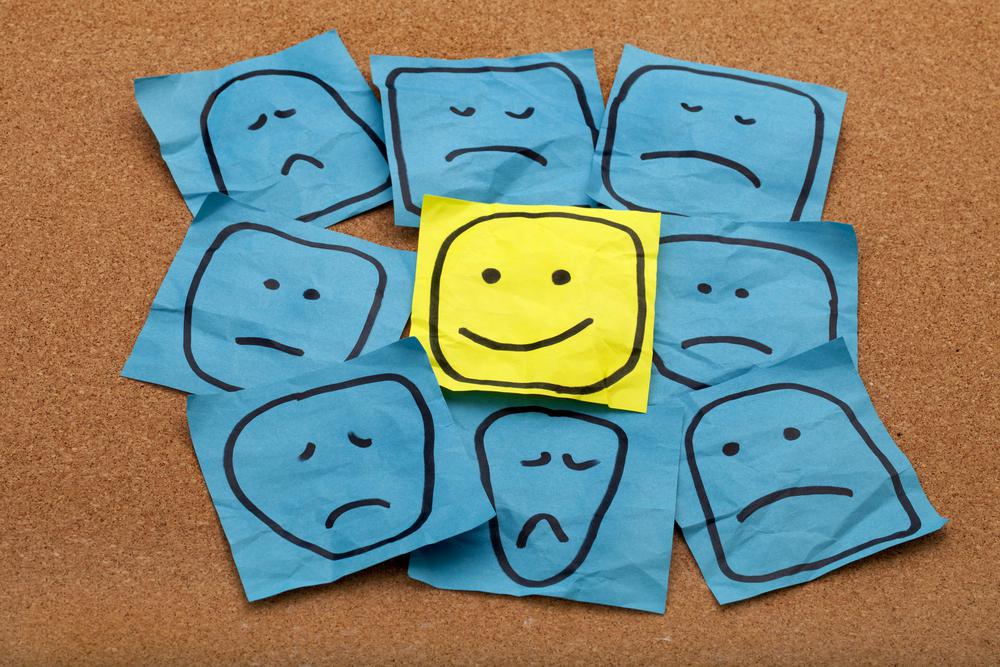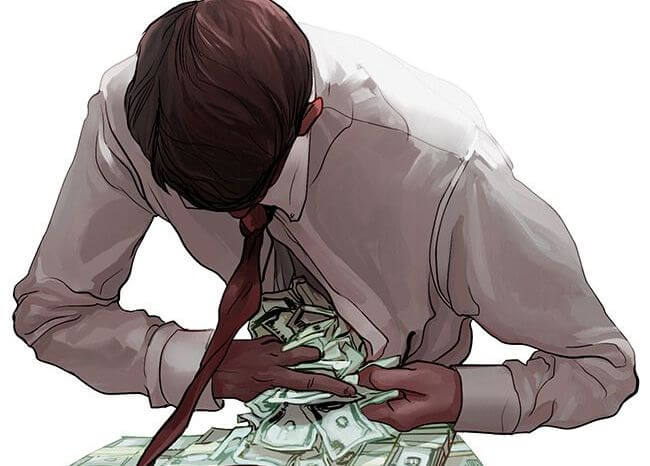I Want to Be Happy in My Own Way

We all want to feel good; this is a point that is hard to argue over. If you ask other people what they want to achieve in their lives, rarely will they respond that they want to be miserable, sad, or feel like failures. People want to feel what it is to be happy and they make an effort to find their own way of achieving it.
However, despite the fact that we all want to be happy and satisfied with our lives, many of us do not know how to do this. Defining happiness these days is rather complicated; we live with the paradox that any object can bring you closer to it, but at the same time, nothing seems to be enough to reach it.
More than to a subjective state of happiness, we are running towards a conception that we have transformed into an ideal. Nowadays happiness has come to be a myth stored within objects that make a few richer at the cost of dissatisfying others.
The endless search to “be happy”
A simple search on the Internet is enough to illustrate the current obsession with finding happiness. Millions of articles that tell us what to do or not to do in order to be happy, about what scientists say on the subject of happiness, the steps that must be taken to achieve it, or what the exact path is that we need to go down to reach it.
We are not just obsessed with achieving it; we also want to achieve it in every area of our lives: at work, by ourselves, in our relationships, with our family, each and every day of our lives. We look in every possible corner for the little keys that will help us feel more blessed.

This search is an endless task given that, as it has been defined, it has become an empty ideal, impossible to achieve. The current definition that has been made for happiness is closer to romantic love we see in movies or the heroic search for the Holy Grail than its true meaning.
The happiness business
Corporations and the world of publicity have never been far from the needs of their current and potential clients. Both are always in search of unsatisfied needs, and when there aren’t any, they take it upon themselves to create them or to seek new ways to introduce a product or service that will take their place.
Happiness hooks us, it sells, and the whole world wants it. Corporations know this and they seek, through planned strategies, the loyalty and satisfaction of their clients. They play with our emotions in order to sell us happiness through consumption.
“Happiness has turned into just another element of consumption, as if it were a product that you can acquire in a supermarket by paying the right amount.”
-Ángela Vallvey-

It is not by chance that the economic crisis coincided with the fervent sale of happiness. In times of crisis, happiness is money.
The happiness dictatorship
Not only has happiness turned into an objection of consumerism, but it has also been imposed on us as a fixed norm. We have gone from I want to be happy to I have to be happy and along the way, we have come to accept messages like “where there’s a will, there’s a way.”
These kinds of statements are a double-edged sword. On the one hand, they share positive thinking and the motivation that “nothing is impossible” or “I am going to smile more and complain less,” while on the other hand, we see “I should be happy” or “I tried and I couldn’t, so I did something wrong.”
In the context of a society in times of crisis, where the sale of happiness is a sales strategy for many corporations, it is always a good idea to remember that sometimes, no matter how much we want to do something, we can’t always; without forgetting that the responsibility for not achieving our goals is not always ours.
Happiness doesn’t live alone
Happiness is a subjective feeling just like many others; it is just one of a multitude. Each person’s inner life is made up of emotions and feelings that range from joy and happiness to sadness and anger.
Each emotion has its use and each and every one of them is necessary and fulfills a role in our lives. Emotions help us lend meaning to our experiences, which is why it is necessary for us to experience and feel each of them.
“Disney had to come to teach us that sadness and anger are necessary, that they make us who we are. In Inside Out, the true heroine is sadness, and the fall of Goofball Island in the little girl’s mind the greatest metaphor of what we can go through.”
-Quique Peinado-

What about you: what do you need to be happy?
Happiness isn’t predefined and it doesn’t have anything to do with generic products or magic words. Each person has his or her own peculiarities, tastes, and preferences. What can make one person happy could bring great unhappiness to another.
Happiness doesn’t come from buying the T-shirt with the most positive message written on it, following another person’s plans, or faking smiles so that a picture looks good. It is a lot simpler than all that: it is a matter of asking yourself the right questions and seeking the answers far from standardized texts or empty products.
“Yes, everybody’s happy nowadays. We begin giving the children that at five. But wouldn’t you like to be free to be happy in some other way, Lenina? In your own way, for example; not in everybody else’s way.”
-Aldous Huxley. A Brave New World-
We all want to feel good; this is a point that is hard to argue over. If you ask other people what they want to achieve in their lives, rarely will they respond that they want to be miserable, sad, or feel like failures. People want to feel what it is to be happy and they make an effort to find their own way of achieving it.
However, despite the fact that we all want to be happy and satisfied with our lives, many of us do not know how to do this. Defining happiness these days is rather complicated; we live with the paradox that any object can bring you closer to it, but at the same time, nothing seems to be enough to reach it.
More than to a subjective state of happiness, we are running towards a conception that we have transformed into an ideal. Nowadays happiness has come to be a myth stored within objects that make a few richer at the cost of dissatisfying others.
The endless search to “be happy”
A simple search on the Internet is enough to illustrate the current obsession with finding happiness. Millions of articles that tell us what to do or not to do in order to be happy, about what scientists say on the subject of happiness, the steps that must be taken to achieve it, or what the exact path is that we need to go down to reach it.
We are not just obsessed with achieving it; we also want to achieve it in every area of our lives: at work, by ourselves, in our relationships, with our family, each and every day of our lives. We look in every possible corner for the little keys that will help us feel more blessed.

This search is an endless task given that, as it has been defined, it has become an empty ideal, impossible to achieve. The current definition that has been made for happiness is closer to romantic love we see in movies or the heroic search for the Holy Grail than its true meaning.
The happiness business
Corporations and the world of publicity have never been far from the needs of their current and potential clients. Both are always in search of unsatisfied needs, and when there aren’t any, they take it upon themselves to create them or to seek new ways to introduce a product or service that will take their place.
Happiness hooks us, it sells, and the whole world wants it. Corporations know this and they seek, through planned strategies, the loyalty and satisfaction of their clients. They play with our emotions in order to sell us happiness through consumption.
“Happiness has turned into just another element of consumption, as if it were a product that you can acquire in a supermarket by paying the right amount.”
-Ángela Vallvey-

It is not by chance that the economic crisis coincided with the fervent sale of happiness. In times of crisis, happiness is money.
The happiness dictatorship
Not only has happiness turned into an objection of consumerism, but it has also been imposed on us as a fixed norm. We have gone from I want to be happy to I have to be happy and along the way, we have come to accept messages like “where there’s a will, there’s a way.”
These kinds of statements are a double-edged sword. On the one hand, they share positive thinking and the motivation that “nothing is impossible” or “I am going to smile more and complain less,” while on the other hand, we see “I should be happy” or “I tried and I couldn’t, so I did something wrong.”
In the context of a society in times of crisis, where the sale of happiness is a sales strategy for many corporations, it is always a good idea to remember that sometimes, no matter how much we want to do something, we can’t always; without forgetting that the responsibility for not achieving our goals is not always ours.
Happiness doesn’t live alone
Happiness is a subjective feeling just like many others; it is just one of a multitude. Each person’s inner life is made up of emotions and feelings that range from joy and happiness to sadness and anger.
Each emotion has its use and each and every one of them is necessary and fulfills a role in our lives. Emotions help us lend meaning to our experiences, which is why it is necessary for us to experience and feel each of them.
“Disney had to come to teach us that sadness and anger are necessary, that they make us who we are. In Inside Out, the true heroine is sadness, and the fall of Goofball Island in the little girl’s mind the greatest metaphor of what we can go through.”
-Quique Peinado-

What about you: what do you need to be happy?
Happiness isn’t predefined and it doesn’t have anything to do with generic products or magic words. Each person has his or her own peculiarities, tastes, and preferences. What can make one person happy could bring great unhappiness to another.
Happiness doesn’t come from buying the T-shirt with the most positive message written on it, following another person’s plans, or faking smiles so that a picture looks good. It is a lot simpler than all that: it is a matter of asking yourself the right questions and seeking the answers far from standardized texts or empty products.
“Yes, everybody’s happy nowadays. We begin giving the children that at five. But wouldn’t you like to be free to be happy in some other way, Lenina? In your own way, for example; not in everybody else’s way.”
-Aldous Huxley. A Brave New World-
This text is provided for informational purposes only and does not replace consultation with a professional. If in doubt, consult your specialist.







